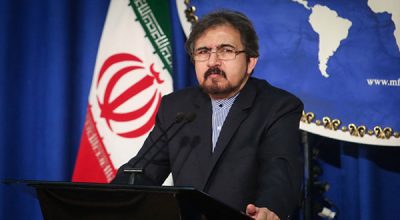Iran: Missile Program Does Not Breach UN Resolution
Iran's missile program is defensive in nature and not in violation of United Nations Security Council [UNSC] Resolution 2231, the Iranian Foreign Ministry stated.

Featured image: Iran Foreign Ministry Spokesman Bahram Qassemi
“The issue of the Iranian missile [program] is an entirely defensive and deterrent matter and in no way contravenes Resolution 2231,” Foreign Ministry Spokesman Bahram Qassemi stressed in his weekly press briefing on Monday.
Resolution 2231 was adopted by the UNSC in July 2015 to endorse a nuclear agreement between Iran and six other countries, the so-called P5+1.
The UNSC document terminated the provisions of seven previous UNSC resolutions against Iran, some of which had imposed restrictions on Iranian missile activities.
Such activities are not prohibited under the newer document, which merely calls on Iran “to refrain from any activity related to ballistic missiles designed to be capable of delivering nuclear weapons.”
Iran says it has no such warheads and no such missiles. It has put its nuclear program under enhanced international monitoring as part of the nuclear deal. And Iranian compliance with the deal has been consistently verified by the International Atomic Energy Agency [IAEA]. Yet, the United States, a party to the agreement, has attempted to portray Iranian missile tests as a violation of the resolution.
While it has failed to get other countries on board, in main part because the text of the resolution is unambiguous, Washington has not stopped claiming that the Iranian missile program breaches Resolution 2231.
Such claims, Qassemi said in his Monday presser, were “unwarranted” and were “often made because of… [the accusers’] ill will toward Iran’s might, particularly its defensive power.”
Responding to a question about the potential violations of the nuclear deal by the US, Qassemi said Iranian decisions on whether violations had occurred rested with the high-level Supervisory Board that has been formed to monitor the implementation of the deal, officially known as the Joint Comprehensive Plan of Action [JCPOA].
He said decisions in that regard were technical and the Supervisory Board would be making relevant comments in the due time.
Iran and the P5+1 countries [Russia, the US, the UK, China, Britain, and France] reached the JCPOA on July 14, 2015 and began implementing it in January 2016.
Iran has been complaining that the US, under the administration of its new president, has been seeking to sabotage international trade with Iran. This is while according to the deal, the US must “refrain from any policy specifically intended to directly and adversely affect the normalization of trade and economic relations with Iran.”

